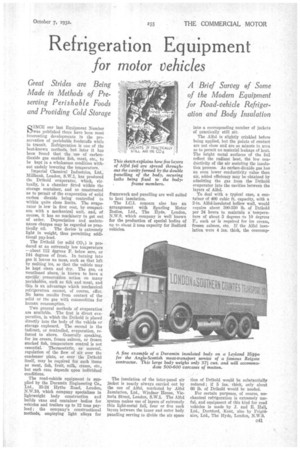Refrigeration Equipment
Page 91

If you've noticed an error in this article please click here to report it so we can fix it.
for motor vehicles
Q INCE our last Equipment Number lamas published there have been most interesting developments in the preservation of perishable foodstuffs while in transit. Refrigeration is one of the best-known methods, but later it has been found that the use of carbondioxide gas enables fish, meat, etc., to be kept in a wholesome condition without unduly lowering the temperature.
Imperial Chemical Industries, Ltd., Milbank, London, S.W.1, has produced the Drikold evaporator, which, virtually, is a chamber fitted within the storage container, and so constructed as to permit of the evaporation of solid carbon dioxide being controlled to within quite close limits. The evaporator is low in first cost, by comparison with a mechanical unit, and, of course, it has no machinery to get out of order. Depreciation and maintenance charges may be regarded as prac tically nil. The device is extremely light in weight, thus permitting additional pay-load.
The Drikold (or solid 002) is produced at an extremely low temperature —about 112 clfgrees F. below zero, or 144 degrees of frost. In turning into gas it leaves no mess, such as that left by melting ice, so that the vehicle may be kept clean and dry. The gas, :.s mentioned above, is known to have a specific preservation action on many perishables, such as flail and meat, and this is an advantage which mechanical refrigeration cannot, of course, offer. No harm results from contact of the solid or the gas with commodities for human consumption.
Two general methods of evaporation are available. The first is direct evaporation, in which the Drikold is placed directly into the body of the vehicle or storage cupboard. The second is the indirect, or controlled, evaporation, referred to above. Generally speaking, for ice cream, frozen salmon, or frozen smoked fish, temperature control is not essential. Thermostatic, or manual, regulation of the flow of air over the condenser plate, or over the Drikold itself, may be required for such items as meat, fish, fruit, milk, cream, etc., but each case depends upon individual conditions.
The road-vehicle equipment is supplied by the Duramin Engineering Co., Ltd., 23-24 Hythe Road, London, N.W.10, which ccirnpany specializes in lightweight body construction and builds vans and container bodies for vehicles and trailers up to 12 tons payload ; the company's constructional methods, employing light alloys for framework and panelling are well suited to heat insulation.
The I.C.I. concern also has an arrangement with Spurling Motor Bodies, Ltd., The Hyde, London, N.W.9. which company is well known for the production of special bodies of up to ahout 2 tons capacity for Bedford vehicles.
The insulation of the inter-panel air jacket is nearly always carried out by the use of Alfol, marketed by Alfol Insulation, Ltd., Windsor House, Victoria Street, London, S.W.1. The Alfol 'system makes use of layers of extremely thin light-metal foil, four or five such layers between the inner and outer body panelling serving to divide the air space into a corresponding number of jackets of practically still air.
The Alfol is slightly crinkled before being applied, but the points of contact are not close and are so minute in area as to permit no material leakage of heat. The bright metal surfaces of the foil reflect the radiant heat, the low conductivity of the air assisting the insulation process. As carhon-dioxide gas has an even lower conductivity value than air, added efficiency may be obtained by admitting the gas from the Drikold evaporator into the cavities between the layers of Alfol.
To deal with a typical case, a container of 400 cubic ft. capacity, with a 2-in. Alfol-insulated hollow wall, would require about 300-350 lb. of Drikold per 24 hours to maintain a temperature of about 5 degrees to 10 degrees F., such as is required for ice cream, frozen salmon, etc. If the Alfol insulation were 4 ins, thick, the consump
tion of Drikold would be substantially reduced: if 5 ins. thick, only about 60 lb. of Drikold would be needed.
For certain purposes, of course, mechanical refrigeration is extremely useful, and equipment of this kind for road vehicles is made by J. and E. Hall, Ltd., Dartford, Kent, also by Frigidaire, Ltd., The Hyde, London, N.W.9.




































































































































































